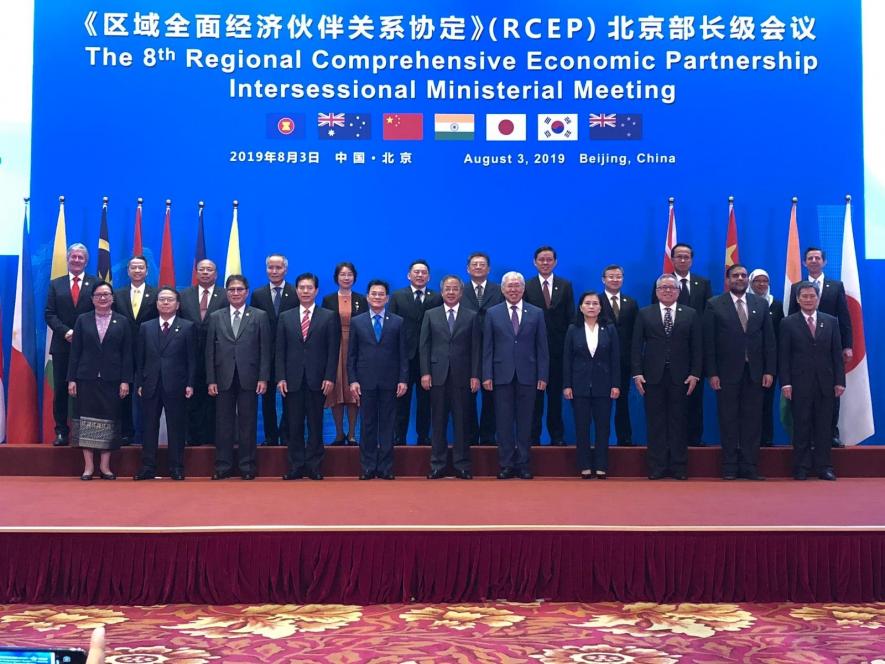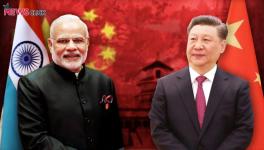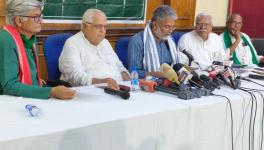India’s RCEP Dilemma: Is There a Way Out?

The 8th Regional Comprehensive Economic Partnership (RCEP) Intersessional Ministerial Meeting
The Indian economy continues to be in a precarious and unstable condition with no sign of the ruling National Democratic Alliance (NDA) getting a firm grip on the situation. Official attempts at data fudging notwithstanding, institutions such as the Asian Development Bank (ADB), Organisation for Economic Cooperation and Development (OECD) and International Monetary Fund (IMF) have all sharply revised growth forecasts for 2019-20 ranging from 5.9% to 6.1 %. Low growth rates and stagnating trade has also been the scourge of the global economy. The World Trade Organisation (WTO) recently slashed its forecast for trade growth in 2019-20 by more than half from 2.6% to 1.2%.
Recent media reports seem to indicate that these global headwinds and a slowing domestic economy are valid reasons for India to hold back on the Regional Comprehensive Economic Partnership (RCEP), by far the most ambitious Free Trade Agreement (FTA) it has negotiated. RCEP includes the 10 member ASEAN (Association of South East Asian Nations) bloc plus China, Australia, New Zealand, South Korea, Japan and India.
Further, a wide spectrum of groups representing farmers, trade unions , civil society groups and domestic industry associations from dairy and automobiles have cautioned Commerce Minister Piyush Goyal on the dangers of RCEP provisions. While the current economic downturn and its concomitant job losses across sectors are valid reasons to go slow on trade integration, there are other more fundamental underlying reasons for developing countries such as India to eschew RCEP and the path of free trade.
Like most new generation FTAs, RCEP rules go well beyond national borders and aim at deep integration and harmonisation of rules in sectors ranging from agriculture, manufacturing, intellectual property, investment, competition and electronic commerce. For India, this is deeply problematic in sectors such as agriculture which, despite being in the throes of a deep crisis, continue to provide employment to nearly half the country’s workforce. Harmonisation, and eventual elimination, of agriculture tariffs will have adverse impacts on small and marginal farmers (with less than two hectares, they comprise over 90% of total farm holdings in the country), who are already grappling with very low farm gate prices. Part of the reason for this crash in prices is due to cheap imports facilitated through previous FTAs with the ASEAN bloc.
Peasant organisations such as the South Indian Coordination Committee of Farmers Movements have highlighted that there is already a high level of cheap imports of pepper, cardamom, rubber and coconut products post the 2010 ASEAN-India FTA. They fear RCEP would further open the floodgates.
A recent paper by trade economist Biswajit Dhar ,that analyses trade data from the Commerce Ministry’s Directorate General of Commercial Intelligence and Statistics (DGCIS), validates these concerns. Dhar shows that after India signed FTAs with RCEP participating economies, such as ASEAN, Japan and South Korea, imports consistently increased. From ASEAN, the increase in the period 2010-2017 was 130% and for Japan and South Korea in the range of 50-60%.
On the other side, Indian exports either increased marginally or had absolute declines during this period.
Increased imports have also been logged in the manufacturing sectors. In a memorandum submitted earlier this month to the Commerce Ministry, 10 Central Trade Unions highlighted that employment-intensive sectors, such as garments, leather, gems and jewellery, have already been impacted through a decline in production due to increased imports. All of this adds up to a massive $112 billion (2018-19) trade deficit with RCEP countries, accounting for 61% of India’s overall deficit. Out of this figure, without an FTA, India’s trade deficit with China is $54 billion (2018-19)
RCEP has also faced controversy on the inclusion of rules on e-commerce. A leaked text of its e-commerce chapter showed that Japan continues to push the US e-commerce model, which was part of the latter’s demands during the negotiations for the Trans-Pacific Partnership (TPP). Called the Digital 2 Dozen, these include obligations for free data flows, no customs duties, no data localisation, no obligations on technology transfers and stronger patents for digital technologies – all of which are designed to entrench the current US hegemony over the internet economy.
At the World Trade Organisation (WTO), India and other developing countries have been rightly sceptical about the inclusion of such rules on the emerging digital economy, as it risks them being locked into what some describe as digital colonialism.
On Intellectual Property Rights (IPR), Japan has been demanding that India commit to provisions beyond its WTO obligations under the Agreement on Trade Related Aspects of Intellectual Property Rights (TRIPS). These include demands for ‘data exclusivity’ and ‘patent term extensions’ and a more stringent application of patents. While data exclusivity, by prohibiting drugs with similar data, will delay the entry of generic drugs in the market, patent term extensions will provide monopoly rights to large pharmaceutical firms above the current 20-year period. Acceding to both these RCEP demands implies that India will need to amend its current legislations, thereby compromising access to affordable medicines.
Patents are also being sought to be applied to seeds by forcing countries, such as India, Indonesia, Thailand and the Philippines to accede to the controversial International Convention for the Protection of New Varieties of Plants (UPOV 1991). Again, India will be forced to change its progressive domestic legislation that provides farmers rights to save seeds and instead allow for monopoly plant breeder rights for agribusiness corporations.
Using a mechanism in Bilateral Investment Treaties (BITs), called the Investor State Dispute Settlement (ISDS), foreign investors have sued the Indian Government for a whopping $12.3 billion. After a slew of such cases, many countries, including Malaysia, Indonesia and India, have attempted remove the ISDS provision from their BITs. Countries such as Japan, Australia and Singapore have been pushing for the RCEP investment chapter to have high levels of protection for investors and it remains to be seen if India can resist the inclusion of rules that primarily protect foreign investors.
The RCEP negotiations began in 2013 and in the 27 rounds of trade talks since, Indian negotiators have mostly been on the defensive. As the Dhar paper shows, despite signing FTAs with many RCEP countries, India has not been able to access their markets. Rather, as the burgeoning trade deficit shows, their exports into India have increased manifold.
The RCEP, by going beyond current FTA and WTO commitments with these countries, will further aggravate India’s skewed trade balance affecting millions of livelihoods in agriculture and industry. What then is the way out?
A New Vision for a Post-Free Trade Framework
India’s trade policy suffers from a deep democratic deficit. Unlike countries such as the US, Malaysia and Thailand, India does not follow a process of parliamentary ratification of trade treaties. Given the intrusion of new generation trade agreements, such as the WTO and RCEP, into domestic policy- making spaces, it is critical that Parliament is adequately consulted during negotiations for and signing of international treaties.
Further, state governments in India have considerable policy autonomy over sectors, such as agriculture, health, taxation and environmental laws and it is, therefore, imperative that they are also brought in meaningfully into the process. On RCEP, the Kerala Government has been consistently asking for consultations saying that the interests of its farmers are reflected in India’s positions, but to no avail. There are also concerns that central ministries, such as agriculture, health, environment and labour, are often kept in the dark about trade parleys by the Commerce Ministry. Clearly, for a country such as India, with vast regional disparities, this situation is untenable and calls for a complete overhaul of the current undemocratic process of trade policymaking by the Commerce Ministry.
Globally, with the impasse at WTO, Brexit, the US withdrawal from the TPP and Trans Atlantic Trade and Investment Partnership (TTIP), free trade is facing a crisis of legitimacy. Despite this, policymakers and trade negotiators are unable to break out of neo-liberal dogma and continue to use the same discredited free trade framework while negotiating trade and investment partnerships, such as the RCEP. This need not be the case.
During the Uruguay Round of trade negotiations (1986-1994) that led to the creation of WTO in 1995, countries such as Brazil and India argued against a ‘one size fits all’ approach and called for more flexibilities, special and differential treatment and different standards for developing countries, keeping in mind their developmental needs for industrialisation, growth of their incipient services sectors and protection of the peasantry. Such an approach to trade continues to be relevant today. We need to reclaim the debates around industrial policy, public services and an agriculture policy focussed on the needs of the farming community.
Trade policy then follows – subservient to a country’s policies towards the domestic economy and the needs of peasants and workers. To paraphrase economist Karl Polanyi, what is required is re-embedding trade policy in the domestic economy and society, rather than trade policy being driven by neo-liberal dogma and markets.
Benny Kuruvilla heads the India office of Focus on the Global South, an activist think-tank in Asia providing analysis and building alternatives for just, social economic and political change.
Get the latest reports & analysis with people's perspective on Protests, movements & deep analytical videos, discussions of the current affairs in your Telegram app. Subscribe to NewsClick's Telegram channel & get Real-Time updates on stories, as they get published on our website.
























